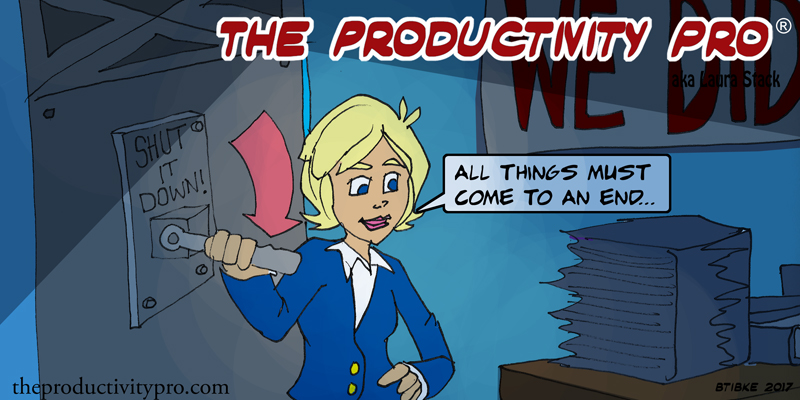
“There’s a light at the end of the tunnel/ Loooooord, I hope it ain’t no train.” —B.B. Watson, American singer
All things, good or bad, must come to an end—even your projects, hallelujah. Whether you’ve nailed your goal perfectly, on time and under budget, or you just missed hitting your quota, you’ve hit the end of the line. Game over.
But… even when you’re done, you’re not quite done. You still must put that project to bed. Even if closing the project isn’t your primary task, or someone else acts as the primary, flexing those closing muscles contributes not just to your experience, but to your productivity. The quicker you put the project to bed, the quicker you start the next one.
Here are six simple steps that contribute to effective, productive project closure:
-
Check the timeline. The first two steps ensure you deliver to the customer what you promised. So, scan your timeline first, to make sure you did everything you intended to. When you get in a hurry, you may accidentally bypass some items. Ideally, you’ll catch them well before you finish the project, but sometimes it doesn’t happen. We all make mistakes.
-
Clear the “parking lot.” Then there are the items you deliberately put aside in a “parking lot” section of your plan because you didn’t have all the resources or preceding steps ready, they didn’t fit at that time, or you wanted to deal with them later. Make sure you did. In either of these first two cases, you may have to call a halt on the closure, so you can accommodate some of these items before you finalize the project and turn it in.
-
Archive all your materials and documents, including off-site backups for the latter. In movies and TV, they often keep their old sets, so they can use them again later, if a need comes up or they have to redo or add scenes. They also archive old scripts to refer to, especially on a long-running TV show or movie franchise. You can do the same with materials from your projects, especially documents and other paperwork. The latter are most easily and effectively stored in offsite, electronic format, but you might also want a paper backup, since formats change as time changes.
-
Ensure project closure with your client. Once the project is fully complete, send the deliverable to your customer (internal or external). Make sure you provide everything they need and asked for. Have the customer verify they have everything they requested and “sign off” on the project in writing.
-
Ask for feedback from the client, as well as their customers if you can get it. This will help you learn what worked, what did not, and what to upgrade in the future.
- Conduct a post mortem. Look back over the project after you’re done. Ask yourself these questions: What worked? What didn’t? What have we learned? How can we do better next time? Whenever you must deal with a similar project in the future, you can apply these lessons to it from the beginning. Needless to say, thank and congratulate those who conducted the project and helped close it, so they feel valued.
In the End, It Actually Does Matter
Project management is a learning process, no matter how long you’ve done it, who you are, and how you fit into it. This is especially true for project closure. You won’t likely be the sole person involved with closure, even if you’re the PM. But if you’ll keep the above six points in mind while closing the project, you’ll be well positioned to put the project to bed and have it stay there.
About Laura Stack, your next keynote speaker:
© 2019 Laura Stack. Laura Stack, MBA, CSP, CPAE is an award-winning keynote speaker, bestselling author, and noted authority on employee and team productivity. She is the president of The Productivity Pro, Inc., a company dedicated to helping leaders increase workplace performance in high-stress environments. Stack has authored eight books, including FASTER TOGETHER: Accelerating Your Team’s Productivity (Berrett-Koehler 2018). She is a past president of the National Speakers Association, and a member of its exclusive Speaker Hall of Fame (with fewer than 175 members worldwide). Stack’s clients include Cisco Systems, Wal-Mart, and Bank of America, and she has been featured on the CBS Early Show and CNN, and in the New York Times. To have Laura Stack speak at an upcoming meeting or event, call 303-471-7401 or contact us online.
Here’s what others are saying:
“What I enjoyed most about your presentation was that it was not only engaging but also practical in application. I’ve read everything from Covey’s system to “Getting Things Done,” and you presented time management in a way that is the easiest I’ve seen to digest and apply. Thank you for helping our system today!”
—John-Reed McDonald, SVP, Field Operations, Pridestaff
“Laura is an incredible speaker who takes practical information to improve productivity and efficiency and makes it interesting and fun! She has a great sense of humor and completely engaged our corporate and sales team. Laura motivated everyone to take steps to make their lives more productive and efficient.
—Molly Johnson, Vice President Domestic Sales, Episciences, Inc.
“Ms. Laura Stack’s program received the highest scores in the 13-year history of the Institute for Management Studies (IMS) in Cleveland! From the 83 participants, the workshop received a perfect 7.0 for “Effectiveness of the Speaker” and 6.8 for “Value of the Content.” Managers especially valued learning about task management, how to minimize interruptions, organizing with Outlook, prioritizing, effectively saying ‘no,’ how to set boundaries, and recognizing self-imposed challenges to time management.”
—Don Gorning, Chair, Institute for Management Studies Cleveland


